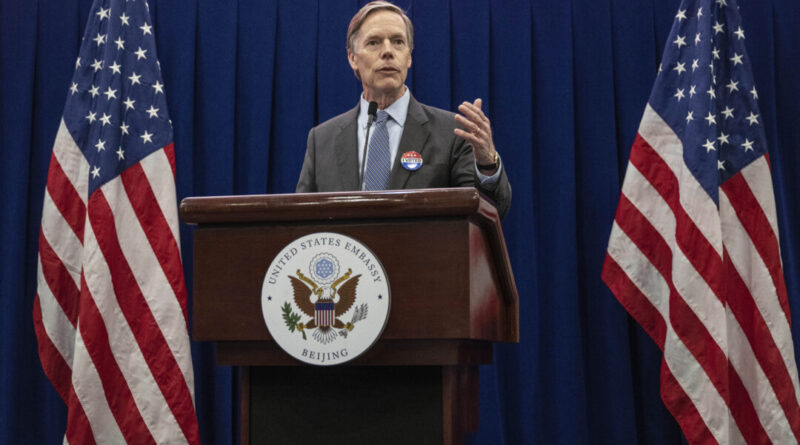Washington is deeply concerned by China’s ’restrictions on fundamental freedoms and its use of transnational repression,’ says U.S. ambassador to China.
As the world commemorates Human Rights Day, the European Union (EU) and the United States shine a spotlight on the ongoing abuses by the Chinese communist regime, which has extended far beyond its borders.
In a
video released on Dec. 10, U.S. ambassador to China, Nicholas Burns, reiterated Washington’s “deep concern” about the regime’s “restrictions on fundamental freedoms and its use of transnational repression.”
Echoing this sentiment, the EU also urged the regime to refrain from extending its arm of repression into foreign nations.
“China must also respect the principle of non-refoulement and refrain from any extraterritorial activity (including coercion) that is not in line with international law,” the EU’s diplomatic arm, the European External Action Service (EEAS), said in a
statement.
The Chinese Communist Party’s (CCP) transnational repression drew world attention two years ago when a report by Rome-based rights group Safeguard Defender exposed a global network of secret Chinese police stations. An
updated report indicated that the total number of these police outposts surpassed more than 100 worldwide. While the majority are located in Europe, there are at least four known sites in the United States.
The U.S. Justice Department has
prosecuted two men in connection with their involvement in such a scheme in New York. According to the complaints, they allegedly operated under the CCP’s orders, employing tactics of harassment against dissidents, stalking pro-democracy activists, and orchestrating counterprotests aimed at derailing demonstrations held by a persecuted faith group, Falun Gong.
An April
human rights report from the U.S. State Department has shed light on the efforts by the CCP to intimidate dissidents beyond China’s borders. The report outlines tactics used by the regime and its agents in foreign countries, including threats, harassment, surveillance, and cases of forced disappearances.
In response, Texas Gov. Greg Abbott
signed an
executive order in November. The order mandates the state’s public safety department to target and apprehend individuals who are operating under the CCP’s directives to conduct influence operations or forcibly repatriate dissidents back to China.
In Brussels, the European Parliament adopted a resolution in October that highlighted the long-arm jurisdiction as well as the repression of Uyghurs and other Muslim minorities by Beijing. This resolution
calls on all 27 member states to take action against the transnational repression faced by Chinese dissidents and Uyghurs within their borders, urging them to hold accountable those responsible for such violations.
As the world marked the 76th anniversary of the U.N. Universal Declaration of Human Rights on Dec. 10, human rights raised alarm over the rising tide of transnational repression, fearing that conditions are worsening rather than improving.
Ding Lebin, whose campaign to rescue his
imprisoned father has captured
global attention, voiced his concerns that the regime’s transnational repressions and espionage activities have
intensified, particularly against Falun Gong practitioners in both Europe and the United States.
Ding’s father received a three-year jail term in December 2023 for practicing Falun Gong, a spiritual practice that
has been brutally persecuted by the CCP since 1999, and is one of 40 individuals whom the EU called for “immediate and unconditional release” on Dec. 10.
Abuses Inside China
Brussels and Washington also reiterated their concerns about the repressions in Xinjiang, where the Chinese regime has subjected Uyghurs and other Muslim minorities to mass detention and surveillance, and Tibet, where traditional Buddhist culture and religious practices have faced political repression.
The EEAS said the EU called on “accountability and justice” regarding rights violations in Xinjiang, while Burns urged the regime to put an end to the ongoing abuses plaguing the two far western regions.
“The United States reiterates its deep concern with the People’s Republic of China’s failure to live up to its international commitments to protect human rights and fundamental freedoms enshrined in the Declaration,” Burns said in the video.
This year’s Human Rights Day—marking 76 years since the U.N. adopted the foundational document designed to protect the rights of free speech and belief for every individual—comes as the national security trails of Jimmy Lai
continue in Hong Kong.
Lai, an outspoken critic of the CCP and founder of the now-shuttered Apple Daily newspaper, has been held behind bars since December 2020 for other charges related to his role in the pro-democracy protests that engulfed Hong Kong in 2019.
On
Nov. 20, Lai made his first appearance in a Hong Kong court under the controversial national security law imposed by the CCP, which carries a maximum sentence of life in prison.
Calling the trial of Lai “unjustified,” the U.S. ambassador called on Beijing to “halt its ongoing abuses” in Hong Kong.
The EU also highlights its “great concern” regarding the “politically motivated trials of pro-democracy figures,” including Lai and the 45 leading pro-democracy activists who received jail terms of
up to 10 years in a national security trial last month.
Meanwhile, the CCP suggests it would continue to tighten its grip on Hong Kong. On Dec. 10, Beijing’s foreign ministry
announced plans to impose
visa restrictions on U.S. personnel who “acted egregiously” in Hong Kong affairs.
Mao Ning, the ministry’s spokesperson, didn’t specify who exactly would be affected by these new restrictions but made the announcement in response to questions about the
planned sanctions by the United States.
The State Department
said last month that it is preparing to implement new visa restrictions against multiple Hong Kong officials. The decision was in response to the sentencing of 45 legal scholars, former lawmakers, and politicians under Hong Kong’s national security law, which has faced widespread condemnation from foreign governments and human rights groups.





